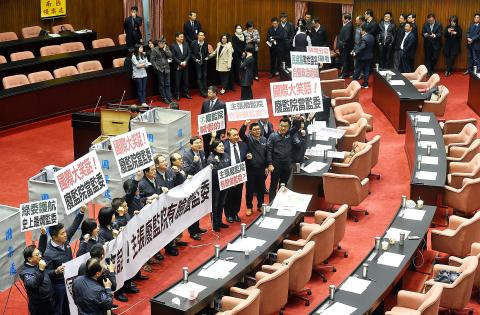All of the Democratic Progressive Party’s (DPP) 11 Control Yuan member nominees were approved by the legislature yesterday in a vote that went along party lines.
Former Judicial Reform Foundation chief executive officer Kao Yung-cheng (高涌誠), former Presidential Office secretary-general Chen Shih-meng (陳師孟), former Taiwan Association for Disability Rights secretary-general Wang Yu-ling (王幼玲), former minister without portfolio Lin Sheng-feng (林盛豐), National Yang Ming University public health professor Peter Chang (張武修), former Taipei Department of Legal Affairs commissioner Yang Fang-ling (楊芳玲), former judge Tsai Chung-yi (蔡崇義), former Taipei Awakening Foundation director-general Yang Fang-wan (楊芳婉) and former DPP legislators Tien Chiu-chin (田秋堇), Walis Perin and Chao Yung-ching (趙永清) all secured at least 70 “yes” votes from the 73 lawmakers who voted.
Walis Perin garnered the most “yes” votes with 73.

Photo: Chu Pei-hsiung, Taipei Times
The Chinese Nationalist Party (KMT) caucus called the approvals “shameless” and an “international joke.”
The DPP used to vilify the Control Yuan, but now that it has the right to nominate its members, the post has suddenly generated renewed interest, KMT caucus secretary-general Lin Wei-chou (林為洲) said.
It is evident from the question-and-answer sessions on Monday and Friday last week that what used to be criticized by the DPP as an obsolete agency and the “appendix” of the constitutional system has enticed nominees, all of whom were eager to assume the post, Lin said.
Chen said that the Control Yuan was “junk,” but that “it can be reused,” Lin said.
“Does a job whose responsibility is to reuse junk justify a monthly salary of NT$190,000?” he asked, referring to the Control Yuan members’ salary.
Lin said the KMT caucus unilaterally agreed that none of the nominees can be justified and KMT lawmakers decided against exercising their right of investiture during the vote.
If President Tsai Ing-wen (蔡英文) is serious about carrying out constitutional reforms, she should have waited until the legislature finished discussing the issue before deciding whether to make nominations, KMT caucus deputy secretary-general Lee Yen-hsiu (李彥秀) said.
Rushing to make nominations only shows that the DPP treats the position of Control Yuan member as a tool for its pork-barrel politics, she said, expressing the concern that the new members might override the judiciary on behalf of the DPP.
KMT Legislator Alicia Wang (王育敏) panned Chen for saying that he would take action against judges who were allegedly biased against members of the pan-green camp — including former president Chen Shui-bian (陳水扁) — while deliberating on cases.
Chen Shih-meng, while being questioned by KMT lawmakers on Monday, said he believed the former president is a victim of judicial persecution.
Chen Shih-meng’s remarks were no different from trampling on the nation’s judiciary, Alicia Wang said, questioning Tsai’s resolve to push for judicial reforms for nominating someone so biased against the judiciary.
The People First Party abstained from voting yesterday, while New Power Party legislators Huang Kuo-chang (黃國昌), Hsu Yung-ming (徐永明), Kawlo Iyun Pacidal and Freddy Lim (林昶佐) voted.
KMT Legislator Chen Chao-ming (陳超明), the only KMT member who cast votes, said he voted only for Walis Perin and not for the rest.
KMT caucus whip Lin Te-fu (林德福) said he would report to KMT headquarters Chen Chao-ming’s defiance of the caucus’ agreement to withdraw from voting, recommending punishments.

Several Chinese Nationalist Party (KMT) officials including Chairman Eric Chu (朱立倫) are to be summoned for questioning and then transferred to prosecutors for holding an illegal assembly in Taipei last night, the Taipei Police said today. Chu and two others hosted an illegal assembly and are to be requested to explain their actions, the Taipei City Police Department's Zhongzheng (中正) First Precinct said, referring to a protest held after Huang Lu Chin-ju (黃呂錦茹), KMT Taipei's chapter director, and several other KMT staffers were questioned for alleged signature forgery in recall petitions against Democratic Progressive Party (DPP) legislators. Taipei prosecutors had filed

Taiwan would welcome the return of Honduras as a diplomatic ally if its next president decides to make such a move, Minister of Foreign Affairs Lin Chia-lung (林佳龍) said yesterday. “Of course, we would welcome Honduras if they want to restore diplomatic ties with Taiwan after their elections,” Lin said at a meeting of the legislature’s Foreign Affairs and National Defense Committee, when asked to comment on statements made by two of the three Honduran presidential candidates during the presidential campaign in the Central American country. Taiwan is paying close attention to the region as a whole in the wake of a

NEW WORLD: Taiwan is pursuing innovative approaches to international relations through economics, trade and values-based diplomacy, the foreign minister said Taiwan would implement a “three-chain strategy” that promotes democratic values in response to US tariffs, Minister of Foreign Affairs Lin Chia-lung (林佳龍) said. Taiwan would aim to create a “global democratic value chain,” seek to capitalize on its position within the first island chain and promote a “non-red supply chain,” Lin was quoted as saying in the ministry’s written report to the Legislative Yuan submitted ahead of the legislature’s Foreign Affairs and National Defense Committee meeting slated for today. The Ministry would also uphold a spirit of mutual beneficial collaboration, maintaining close communication and consultations with Washington to show that Taiwan-US cooperation

Taiwan and the US have begun trade negotiations over tariffs imposed by US President Donald Trump earlier this month, Minister of Foreign Affairs Lin Chia-lung (林佳龍) said in an interview this morning before reporting to the Legislative Yuan’s Foreign Affairs and National Defense Committee. The Taipei Economic and Cultural Representative Office (TECRO), Taiwan’s de facto embassy in the US, has already established communication channels with the US Department of State and the US Trade Representative (USTR), and is engaging in intensive consultations, he said. Points of negotiation include tariffs, non-tariff trade barriers and issues related to investment, procurement and export controls, he